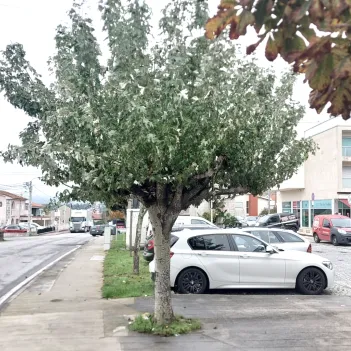InPUT
Engaging Places and Communities for Inclusive Peri-Urban Transitions

© InPUT
- Category
- Project
- Call
- DUT Call 2022
- Duration
- –
- Project coordinator
- Delft University of Technology
The InPUT project explores how the principles of proximity, accessibility and liveability of the 15-minute city can be extended across European peri-urban areas and endorsed by local societies. While the popularity of the 15-minute city is linked to its implementation in the dense core cities most suited to adopt it, a wide-ranging urban transition requires rethinking the model to serve a broader set of urban conditions.
Peri-urban areas are an important frontier to implement principles of proximity, accessibility and liveability, as these highly dynamic areas are deeply embedded in ongoing socio-ecological transitions but may struggle to comply with sustainability goals and provide a high quality of life for their inhabitants. They often lack amenities, services and transportation networks, tend to have fragmented spatial structures and their governance resources and community aspirations may differ from those in large core cities.
Often below the radar of policymakers and researchers, peri-urban communities are integral parts of the European urban landscape. It is therefore crucial to extend the 15-minute city principles to these locations where implementation may be more difficult but interventions may be more urgent. In other words, we aim to democratise the 15-minute city.
InPUT argues that peri-urban conditions cannot be reduced to a generic type, developing a typological classification for these areas according to their spatial and demographic characteristics and differentiating their main proximity, accessibility and liveability challenges. In parallel, we move the 15-minute city discussion beyond technical and design problems to also examine social aspects. This includes governance capacities, which influence investments and priorities, and the values and aspirations of local inhabitants, which determine what constitutes ‘their’ 15-minute city and the desirability of the transformations.
Accordingly, in the first stage, the project works with local stakeholders to analyse spatial, functional and mobility needs, institutional conditions and community aspirations. In a second stage, that shared knowledge is used to co-design spatial visions and strategic transformations that enable more liveable peri-urban environments. Meanwhile, the project develops criteria to evaluate the performance of these visions along principles of wellbeing, sustainability and inclusion. By 'opening up' discussion spaces to various voices but also 'closing down' towards robust, aspirational visions of the future, we provide conceptual models transferable between locations and practical visions grounded in specific sites. For that purpose we investigate peri-urban case studies in the Netherlands, Belgium, Austria and Portugal.
Our approach to European peri-urban territories brings policy and research innovation at the level of transdisciplinary integration beyond a technical focus, by embedding social and institutional aspects into 15-minute city visions and strategies; local participation beyond top-bottom replicability, by having stakeholders co-define the bundle of needs that materialises a 15-minute city; and conceptual differentiation, by designing not one but many viable, locally fitting 15-minute cities and transformation pathways to achieve them.
The project will deliver a catalogue of spatial, institutional and social conditions, needs and potentials of peri-urban areas, a series of spatial visions and transformation strategies for place-specific models of proximity, accessibility and liveability, and a set of newly developed indicators to assess the performance and prospects of these visions and strategies. By doing that in a locally grounded and participatory manner, we contribute with results that different peri-urban areas can not only implement, manage and benefit from, but also aspire, co-design and recognise as their own.
Austria
Belgium
The Netherlands
Portugal
Faculdade de Letras Da Universidade Do Porto, Technische Universitaet Wien, Universidade Do Minho, Universiteit Antwerpen
Hannah Arendt Institute, Ministerie Van Binnenlandse Zaken En Koninkrijksrelaties, Ministerie Van Infrastructuur En Waterstaat, Municipio de Braga, Team Vlaams Bouwmeester, Verein Niederösterreich Wien, Gemeinsame Entwicklungsräume
Contact
Rodrigo Cardoso
r.o.v.cardoso@tudelft.nl